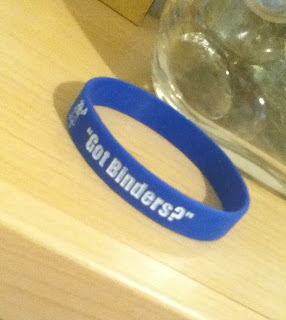I recently saw a (web) presentation on medication
adherence. According the presenter, about 50% of patients living in developed
countries do not follow treatment recommendations. I was very surprised to hear
this statistic (So surprised, that I even confirmed it via wikipedia). Fifty percent is a
huge number, and I think that taking your meds the way your doctor has
prescribed them is critical to improving your health, especially during one’s
recovery from surgery.
 |
| Bracelet to remind me of my binders |
After my transplant, taking my medication is even more
important, specifically the anti-rejection or immunosuppressants. To ensure
that I have adequate levels in my blood stream, I need to take my medication
every 12 hours, like clockwork. It is very important. I have an alarm in the
morning and in the evening as a reminder and a prescription diary to keep track
of what I take daily. The transplant
pharmacist once told me that a transplant recipient lost the kidney because
that patient kept forgetting to take his/her medication on time. Since I am
determined to keep this kidney for a long time, it is very important to me to
take my meds at the specified time.
Don’t get me wrong. I do forget my medication sometimes.
I can think of more than a handful of times when I forgot to take my blood
pressure pills or even my phosphate binders. The key is to make it the
exception, not the rule. For blood pressure pills, take them as soon as you
remember. Also, make a note on what occasions make you forget to take them
(mine is usually when I am in a hurry or distracted) and try to correct it.
In that presentation, I learned that many people never
order their prescriptions. Some order them, but never pick up their filled
prescriptions from the pharmacy. Other people pick up their medication, but
don’t follow their physician’s instructions.
Although I have had a history of researching every medication that has
been prescribed to me and sometimes questioning why I take them, I usually work
with my physician to get a win-win situation. As an example, I have not been a
big fan of taking statins for cholesterol. I’ve read of the side effects,
have seen those side effects first-hand, and would prefer an alternative drug.
However, I worked with my then primary care physician to lower my cholesterol
(specifically triglycerides) without taking statins. We found an alternate
drug. Ironically, I am taking statins now for maintenance (I may have a
conversation with my transplant nephrologist after a few months).
That presentation inspired me to be more mindful of
taking my medication regularly, and I am hoping this post will inspire you to
do the same. Do whatever it takes to take them on time and at the correct dosage, whether you need
to set an alarm or keep a diary. “Not taking your medicine as directed can also
lead to other health problems, especially if you already have asthma, diabetes,
or high blood pressure” (From ScriptYourFuture.com). And remember, diabetes and
hypertension can lead to kidney disease.

No comments:
Post a Comment